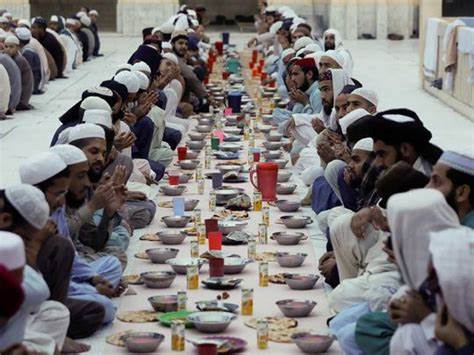By Muhammad Mohsin Iqbal
Ramadan Mubarak is not far from us, and as the blessed month approaches, Muslims in Pakistan and around the world prepare to observe the fast with devotion and respect. Considered the month of mercy and forgiveness, this holy month is eagerly awaited by over two billion Muslims around the world. It provides believers with an opportunity to purify their souls, seek Allah’s mercy, and strengthen their faith through prayer, charity, and self-control. The importance of Ramadan is deeply rooted in Islamic teachings, as stated in the Quran: “O you who have believed! Fasting has been prescribed for you as it was prescribed for those before you, that you may become righteous.” (Surah Al-Baqarah 2:183). The Prophet Muhammad (peace and blessings of Allah be upon him) also emphasized the importance of fasting, saying:
“Whoever fasts the month of Ramadan out of faith and in the hope of reward from Allah, all his
previous sins will be forgiven.” (Sahih Bukhari).
In many Islamic nations, as well as in non-Muslim countries with considerable Muslim
populations, special provisions are made to ensure the ease of fasting for all. Governments and
charitable organizations work in unison to offer essential commodities at reduced prices,
allowing individuals from all social classes to partake in this sacred observance without undue
hardship. Markets extend significant concessions on food and beverages, and alms are
distributed among the impoverished. However, the reality in Pakistan stands in stark contrast
to this ideal. Though special Ramadan bazaars are established in every city, ensuring
affordability and quality remains an elusive goal.
It has long been observed that, as Ramadan approaches, the prices of fundamental necessities
experience an unjustified surge. Certain merchants, driven by avarice, engage in the
unscrupulous practice of hoarding goods—particularly fresh fruits and beverages—only to
release them at exorbitant rates once the holy month commences. Dates, bananas, apples, and
other such essentials, indispensable for the Iftar meal, become almost unattainable for the
common man. This merciless price inflation leaves the consumer helpless.The distress is
heightened when parents, compelled by their children’s innocent desires for a wholesome Iftar,
find themselves struggling to procure even the most basic sustenance.
The grievous irony is that a month devoted to piety and self-restraint is tarnished by economic
exploitation. Where fasting is intended to cultivate patience, gratitude, and compassion for the
less fortunate, the unethical pursuit of profit in Pakistan runs counter to these very tenets.
Elsewhere in the Muslim world, governments undertake rigorous measures to ensure that
traders do not take undue advantage of the heightened demand. In the Kingdom of Saudi
Arabia and the United Arab Emirates, stringent price regulations are enforced, with heavy
penalties imposed upon those found guilty of hoarding or price manipulation. Similarly, in
Turkey and Malaysia, Ramadan is a period of extensive welfare programs, wherein food aid is
dispensed generously, and essential commodities are made available at significantly reduced prices. Even in certain non-Muslim countries, particularly in Western lands where Muslims
reside in great numbers, supermarkets launch special Ramadan campaigns to make foodstuffs
more affordable.
Despite repeated declarations by the Pakistani authorities to curb inflation during Ramadan,
the situation remains unchanged year after year. Market committees and consumer protection
bodies prove ineffective, while merchants continue to exploit the absence of stringent
oversight. At times, frustrated citizens have endeavored to launch fruit boycotts as a means of
protest, yet such efforts have borne little fruit. It is imperative that the state enforces robust
price control mechanisms, meting out exemplary punishments to hoarders and profiteers. If
other nations, both Muslim and non-Muslim, can successfully regulate their markets during
Ramadan, there is no plausible reason why Pakistan should be unable to do the same.
In addition to price regulation, ensuring the provision of wholesome food is of paramount
importance. It is all too common that substandard or adulterated goods infiltrate the markets
during this sacred month, endangering public health. Authorities must take uncompromising
action against those who peddle inferior merchandise. Yet Ramadan should not be reduced to a
mere matter of economic management; it must, above all, be a period of spiritual and social
refinement. The government, private sector, and civil society must collectively endeavor to
restore the true spirit of Ramadan—one of honesty, generosity, and communal welfare.
A peculiar trend is also witnessed in Pakistan wherein numerous businessmen, particularly
those engaged in trade and commerce, capitalize on the month’s soaring prices, only to embark
upon a journey to the Holy Hijaz for the final ten days of Ramadan. While there is great virtue in
spending the last nights of the month in the sacred precincts, one cannot help but question
whether such individuals, who have contributed to the economic burden of the masses, truly
fulfill the spirit of this hallowed period. If those who hold dominion over the supply chains of
essential commodities devoted themselves to ensuring the welfare of the people rather than
amassing wealth, the observance of Ramadan in Pakistan would be far more dignified and
rewarding for all.
Ramadan in Pakistan ought to be a time of solemn reflection and moral rectitude, not one
marred by avarice and exploitation. While the citizens of this land continue to exhibit
extraordinary generosity through almsgiving and communal Iftars, it remains the duty of the
state and the mercantile class to uphold their responsibilities. If economic policies are aligned
with the true essence of Ramadan, and the principles of fairness, compassion, and justice are
upheld, then this sacred month shall truly become a period of both material relief and spiritual
elevation for all Pakistanis.
22
previous post




